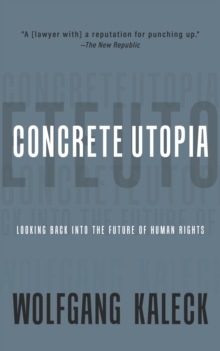Description
| Product ID: | 9781682194393 |
| Product Form: | Paperback / softback |
| Country of Manufacture: | GB |
| Title: | The Concrete Utopia |
| Subtitle: | Looking Backward into the Future of Human Rights |
| Authors: | Author: Wolfgang Kaleck |
| Page Count: | 140 |
| Subjects: | Social and cultural history, Social & cultural history, Social forecasting, future studies, Social classes, Human rights, civil rights, Public international law: human rights, Law: Human rights and civil liberties, Social forecasting, future studies, Social classes, Human rights, International human rights law, Human rights & civil liberties law |
| Description: | Select Guide Rating Concrete Utopia conceptualizes the human rights project of the last two and a half centuries as a “backward-looking” endeavor, which, in order to move forward, must return to the utopian roots of its foundational documents. Human rights advance by judging the ills of the present world from a standpoint in the future where they might no longer exist—a fundamentally utopian gesture. This peculiar character of human rights makes them continually ripe for reinvention and for responding to changing world circumstances. Looking at topics such as the Auschwitz trials in Frankfurt in the mid-1960s, public outrage to the Vietnam War, the US civil rights movement and the founding of Amnesty International in 1961, this book surveys the history of human rights and how they have been reconceived at different points in time. It closes by sketching the way they may be re-envisioned for new struggles in the 21st century. At a time when the human rights project has endured criticism for being toothless or even for providing a pretext for military invasions, Kaleck argues that the current global crises, from inequality, to ecological collapse and the “age of pandemics,” can be countered by reinventing human rights work through feminist, decolonial and ecological interventions. Concrete Utopia conceptualizes the human rights project of the last two and a half centuries as a “backward-looking” endeavor, which, in order to move forward, must return to the utopian roots of its foundational documents. Human rights advance by judging the ills of the present world from a standpoint in the future where they might no longer exist—a fundamentally utopian gesture. This peculiar character of human rights makes them continually ripe for reinvention and for responding to changing world circumstances. Looking at topics such as the Auschwitz trials in Frankfurt in the mid-1960s, public outrage to the Vietnam War, the US civil rights movement and the founding of Amnesty International in 1961, this book surveys the history of human rights and how they have been reconceived at different points in time. It closes by sketching the way they may be re-envisioned for new struggles in the 21st century. At a time when the human rights project has endured criticism for being toothless or even for providing a pretext for military invasions, Kaleck argues that the current global crises, from inequality, to ecological collapse and the “age of pandemics,” can be countered by reinventing human rights work through feminist, decolonial and ecological interventions. |
| Imprint Name: | OR Books |
| Publisher Name: | OR Books |
| Country of Publication: | GB |
| Publishing Date: | 2024-04-04 |


